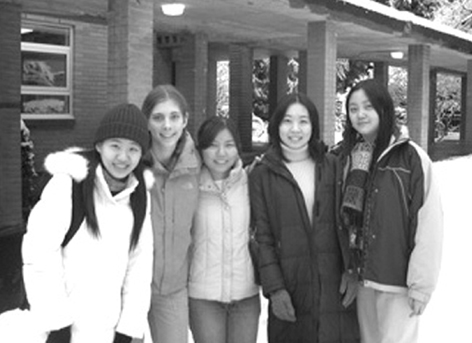Ryu Ji-hye (International Studies, 3) is an exchange student at the University of British Columbia in Vancouver, Canada

Classes
It is no secret that university students in Canada work hard. While the courseload is quite similar to that of Ewha, one particular aspect that would make life at UBC especially difficult for an Ewha student is the exams. There is no set date for exams and professors are free to set dates themselves, which means that students usually have an average of one or two exams every week. As a student who has constantly taken the "lightning strike" approach to schoolwork, I found it difficult to adjust to the constant test-taking environment.
As for the classes themselve, UBC has both good and bad classes. Though class evaluations are not released, students determine which classes to take through non-UBC related websites. "Good" courses provide students with a chance to study stimulating topics from fresh points of view. Most classes require active participation, and it can take up to 30 percent of the final grade.
Campus life
The student body at UBC is extremely diverse. In addition to the sample of students from the ethnically diverse environment of Vancouver, UBC takes in 1000-plus exchange students every year from all over the world. This can be both good and bad for the incoming exchange student. It is good in that the student will experience less of a culture shock when arriving in Vancouver; Asians will especially feel it to be so, as it is rumoured that over half of the student body is Asian. However, the negative effect is that it is difficult to step out of the exchange/international student pool to mix with the locals. There is no racism on campus, but the ethnic divide cannot go unnoticed. Caucasian groups are most active on campus, where Asians are more focused on occasional off-campus gatherings.
This is not to say that an exchange student from Ewha would not be able to be active on campus if one were so inclined. There are more than 200 clubs at UBC which include academic clubs as well as ethnic clubs, religious clubs, and art clubs. They provide exchange students with opportunities to meet UBC students and be involved with the local community.
All in all, UBC provides exchange students with the opportunity to make whatever they wish of their year-long stay. However, I would like to comment on studying abroad in general. We often come across published stories of exchange students' life-altering experiences. This can delude many into thinking that if one were to go abroad for a year, her life would take a sudden turn towards the better. While this is definitely possible, we should not forget that student exchange is not a magical formula for turning one's life around. It deals you the cards, be it good or bad, and whether you win or not depends on how you play the hand.
Ewha Voice
evoice@ewha.ac.kr

